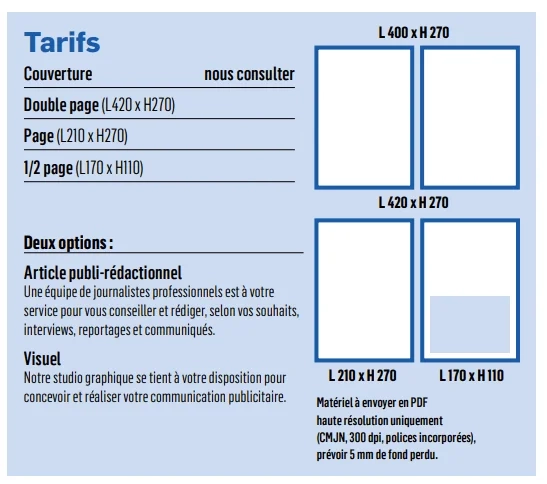Space not available
Reserve this advertising space
Selected ad format
The file format is not recognized
Click here for
send an announcement
Click here to transmit
an announcement
Drag and drop here
or
send an announcement
Send the ad up to 8 days after payment
A link will be sent to you by advertising@via-agency.fr
Bottom reference
Reserved space
Announcement transmitted
Reference

Although Madagascar has abundant water resources, some of the highest in the world, more than half of the Malagasy population does not have access to drinking water (57%). Access to sanitation and hygiene, like access to water, remains one of the major challenges for the development of the country.
Space not available
Reserve this advertising space
Selected ad format
The file format is not recognized
Click here for
send an announcement
Click here to transmit
an announcement
Drag and drop here
or
send an announcement
Send the ad up to 8 days after payment
A link will be sent to you by advertising@via-agency.fr
Bottom reference
Reserved space
Announcement transmitted
Reference
The Water, Sanitation and Hygiene sector is a priority in terms of national commitments made in the context of the country's development. Disparities between urban and rural areas are considerable: just over 69% of people living in urban areas have access to a drinking water supply and nearly 41% of rural residents do not have a water point and are forced to use water from unprotected sources. Only 17% of the population uses improved latrines, and more than 40% of the population still practice open defecation, with a total of more than 15 million people.
As part of the implementation of the Madagascar Emergence Plan (PEM), to promote universal access to drinking water, sanitation and hygiene, Analanjirofo was chosen for the year 2020 as a pilot region of the Madagasikara Madio program whose rate of access to sanitation infrastructure remains below 15%. This program is to continue in other regions.
According to the guidelines presented in the PEM and in the program contract of the Ministry of Water, Sanitation and Hygiene, the objective is to provide access to water at an affordable and equitable rate to 60% of the population in 2023. The Madagasikara Madio Program will enable Madagascar to reach 90% of Malagasy Open Defecation Free (ODF) by providing 55% of Malagasy with access to basic latrines from 2023.
Space not available
Reserve this advertising space
Selected ad format
The file format is not recognized
Click here for
send an announcement
Click here to transmit
an announcement
Drag and drop here
or
send an announcement
Send the ad up to 8 days after payment
A link will be sent to you by advertising@via-agency.fr
Bottom reference
Reserved space
Announcement transmitted
Reference

More than 701,000 medical consultations are due to water-related illnesses. The Ministry aims to continuously increase the number of new beneficiaries of a sanitation system. The goal is to eliminate open defecation by 2025.
In 2021, the Government, through the Ministry of Water, Sanitation and Hygiene (MEAH), decided to strengthen the drinking water supply (AEP) of 15 district capitals and to build 31 new systems for large urban centers.
To address the water service deficit in several areas of Antananarivo, 46 boreholes equipped with a reservoir, a treatment unit and a distribution ramp are being built in areas without water supply.
Madagascar is committed to the SDGs (Sustainable Development Goals) aimed at achieving universal and equitable access to drinking water and sanitation and hygiene services by 2030. The country is thus taking up the challenge of achieving 100% access rates to drinking water infrastructure and basic sanitation and hygiene services by 2030.
Through the following priority projects:
• JIRAMA WATER III project for the Antananarivo metropolitan area – additional production of 100,000 m3/d.
• Grand Sud Project: Rehabilitation of 1748 water system with drilling. 196 km of Pipeline (Ampotaka-Tsihombe, Bemamba-Antaritarika), Resumption of Mandrare Sampona works, Mobilization of the Efaho River;
• Improvement of drinking water systems in the 119 district capitals.
• Construction/rehabilitation of drinking water systems in 1,576 rural municipalities.
These projects will have the following impact in 2023:
• 9,501,000 more people will have access to drinking water
• 2,200,000 inhabitants for the JIRAMA WATER III Project
• 1,785,000 inhabitants at the level of the district capitals
• 5,516,000 inhabitants at the municipal level
Space not available
Reserve this advertising space
Selected ad format
The file format is not recognized
Click here for
send an announcement
Click here to transmit
an announcement
Drag and drop here
or
send an announcement
Send the ad up to 8 days after payment
A link will be sent to you by advertising@via-agency.fr
Bottom reference
Reserved space
Announcement transmitted
Reference


















 A Seat That Transforms into a Bed
A Seat That Transforms into a Bed  In the world of air travel, economy class is often considered the most affordable option. However, at Air Afrika, we believe that affordability shouldn't mean compromising on quality of service. Our class
In the world of air travel, economy class is often considered the most affordable option. However, at Air Afrika, we believe that affordability shouldn't mean compromising on quality of service. Our class









